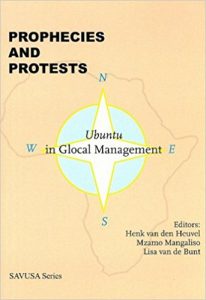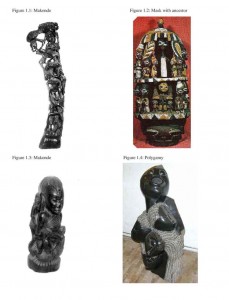Prophecies And Protests ~ Ubuntu And Communalism In African Philosophy And Art
5 Comments During my efforts to set up dialogues between Western and African philosophies, I have singled out quite a number of subjects on which such dialogues are useful and necessary. Recently I have stated in an essay that three themes in the African way of thought have become especially important for me:
During my efforts to set up dialogues between Western and African philosophies, I have singled out quite a number of subjects on which such dialogues are useful and necessary. Recently I have stated in an essay that three themes in the African way of thought have become especially important for me:
1.1 The basic concept of vital force, differing from the basic concept of being, which is prevalent in Western philosophy;
1.2. The prevailing role of the community, differing from the predominantly individualistic thinking in the West;
1.3. The belief in spirits, differing from the scientific and rationalistic way of thought, which is prevalent in Western philosophy (Kimmerle 2001: 5).
In these fields of philosophical thought there are contributions from African philosophers, which differ in a very characteristic way from Western thinking. Therefore in a dialogue on these themes a special enrichment of Western philosophy is possible. In the following text I want to clarify this possibility by concentrating on two notions, which have a specific meaning in the context of African philosophy. To discuss the notions of ubuntu and communalism means working out some important aspects of the second theme. The community spirit in African theory and practice is philosophically concentrated in notions such as ubuntu and communalism. But the concept of vital force, which is mentioned in the first theme, will play a certain role, too. We find the stem –ntu, which expresses the concept of vital force in many Bantu-languages, also in ubu–ntu. For a more detailed explanation of ubuntu, I will depend mainly on Mogobe B. Ramose’s book, which gives the most comprehensive explanation of the philosophical impact of this notion (Ramose 1999). The concept of communalism is explained in the context of the political philosophy of Leopold S. Senghor and other political leaders of African countries in the struggle for independence (Senghor 1964). A vehement critic of that theory is a Kenyan political scientist, V.G. Simiyu (Simiyu 1987). For a philosophical evaluation of this controversy I will refer to the articles and books of Maurice Tschiamalenga Ntumba, Joseph M. Nyasani, and Kwame Gyekye, dealing with the relation between person and community (Ntumba 1985 and 1988; Nyasani 1989; Gyekye 1989 and 1997).
Finally I will briefly look for ubuntu and communalism in African art. I am a lover or African art, but my knowledge of it is not developed on a par with my knowledge of African philosophy. There is no doubt that music and dance are of special relevance in African art. K.C. Anyanwu, in his article ‘The idea of art in African thought’, has stated convincingly that music is the most important form of art in Africa (Anyanwu 1987: 251-3, 259). The cosmic sound has to be answered by human beings, moving together in the same rhythm. From oral literature I will entertain examples of the predominant role of the community and of the position of the individual. I will also refer to some pieces of woodcarving that express the African community spirit and the reciprocal support given by individuals to each other. This is illustrated by Makondes: towers of human beings, leaning one on the other. A special motive is the relation between men and women and between mothers and children, which we find on some masks and sculptures.
It is my contention that it will not be easy to adhere to ubuntu and communalism, which stem from a traditional and mainly rural environment, in a modernised and mainly urban life-world. The bonds of the community, all based on the extended family, unravel in an urban environment, where people get isolated from each other due to living and working conditions. Nevertheless it is of crucial importance that the moral aspects of ubuntu and communalism, and the specific values that are connected with these notions, do not get lost. Their actualisation in philosophy and art can be useful for the endeavour to revitalise them. They can permeate from philosophy and art into other domains of life and be applied in the world of today, also in the domain of management and of organising processes of common work.
My contribution is limited to a short survey of the meaning of ubuntu and communalism in philosophy and art, as I do not feel competent to apply it to management or the science of management.
Main philosophical aspects of Ubuntu and communalism
If a philosopher trained in the West tries to understand the philosophy incorporated in ubuntu thought, s/he will notice that s/he has entered an unfamiliar terrain. The ubuntu way of thought differs greatly from what the Western philosopher is accustomed to. However, Tschiamalenga Ntumba’s demarcation of African and Western ways of thought along these lines, is too simplistic. He states that African philosophy is a philosophy of ‘We’ and Western philosophy is a philosophy of ‘I’ (Ntumba 1985: 83). To reduce ubuntu to the saying ‘I am because we are’, as so frequently happens, is also too schematic. This saying cannot be regarded as a direct African counterpart of Descartes’ dictum ‘Cogito ergo sum’. Things are more differentiated. We have to take into account that the ‘I’, or the person, is becoming increasingly important in African ontology, too. In the West a philosophy of ‘We’ is not impossible and has emerged as a strong philosophical stream called ‘communitarianism’, which stresses the meaning of the community. We thus have to look in more detail to the philosophical impact of ubuntu and of the African community spirit in order to discover what they can mean in the world of today.
Let me start with Ramose’s book African philosophy through ubuntu. The discourse of this book is organised around three proverbs, maxims or aphorisms taken from the language of the Northern Sotho. The first aphorism, ‘Motho ke motho ka batho’ can be understood as a simplification of ubuntu. According to Ramose it expresses the central idea of African philosophical anthropology. It means more specifically: ‘to be human is to affirm one’s humanity by recognising the humanity of others and, on this basis, establish respectful human relations with them’. In other words, my human-ness is constituted by the human-ness of others, and vice versa. And the relations between human beings, other persons and me, are characterised by mutual recognition and respect. The second aphorism, ‘Feta kgomo o tshware motho’, says in a condensed formulation: ‘if and when one is faced with a decisive choice between [one’s own] wealth and the preservation of the life of another human being, then one should opt for the preservation of life’. Hereby a basic principle of social philosophy is presupposed: the other ranks higher than I myself, especially when his/her life is in danger. This is due to the fact that life or life force is the highest value, which determines also the relations between human beings. The third maxim is about kingship and expresses a fundamental aspect of political philosophy. The formulation of this third maxim, ‘Kgosi ke kgosi ka batho’ is very much similar to the first one. It relates kingship like human-ness in general to the humanity of others and demands mutual recognition and respect. In the words of Ramose it means ‘that the king owes his status, including all the powers associated with it, to the will of the people under him’ (Ramose 1999: 193194, see also 52, 120, 138, 150, and 154).
However, ubuntu has aspects that reach further than the contents of these proverbs. It has to be discussed in a comprehensive ontological horizon. It shows how the be-ing of an African person is not only imbedded in the community, but in the universe as a whole. This is primarily expressed in the prefix ubu-of the word ubuntu. It refers to the universe as be-ing enfolded, containing everything. The stem –ntu means the process of life as the unfolding of the universe by concrete manifestations in different forms and modes of being. This process includes the emergence of the speaking and knowing human being. As such this being is called ‘umuntu’ or, in the Northern Sotho language, ‘motho’, who is able by common endeavours to articulate the experience and knowledge of what ubu-is. Thus –ntu stands for the epistemological side of be-ing. This is the wider horizon, in which the inter-subjective aspects of ubuntu have to be seen. Mutual recognition and respect in the different inter-subjective relations are parts of the process of unfolding of the universe, which encompasses everything, in the speaking and knowing of human beings. This process in itself leads to the forms of inter-subjective relations that have been mentioned above. Ramose underlines the oneness and the whole-ness of this ongoing process (Ramose 1999: 49-52).
Through this more comprehensive explanation of ubuntu in its ontological and epistemological dimension it becomes understandable that ubuntu can be regarded as a specific approach to African philosophy in its different disciplines. We have already seen how this is valid for disciplines such as philosophical anthropology, social and political philosophy, and by the same token for ontology and epistemology. Other disciplines, such as metaphysics and philosophy of religion, logic and ethics, philosophy of medicine, philosophy of law and philosophy of economy, including problems of management, are taken into account, as is philosophy of art, although this latter subject is not treated in Ramose’s book.
In connection to this new approach to African philosophy, a different use of language is necessary. It has already become clear that ubu–ntu is approached ‘as a hyphenated word’ and that a specific interpretation flows from this way of writing it. The same applies to words such as be-ing, whole-ness or one-ness. The hyphen between the two parts of the words signifies that they have to be understood as processes or in a dynamic sense. So it could be said that ubuntu is about human-ness (if the hyphen between human-and – ness is taken in its specific meaning). At any rate it is important not to understand ubuntu as an -ism like in the word humanism. Therefore, Ramose criticises the title of the book written by S. and T.M. Samkange: Hunhuism or Ubuntuism. According to Ramose these authors, when they speak of ‘a Zimbabwe indigenous political philosophy’, also give a restricted meaning to ubuntu (or hunhu, which is the word for ubuntu in the language of the Shona in Zimbabwe), neglecting the broader dimensions of this notion (Ramose 1999: 51). The suffix -ism indicates ‘fragmentative thinking’, which gives the general state of affairs with regard to a certain subject-matter. That is not in accordance with ubuntu as a whole-ness and a constant flow of be-ing. Ramose aims at a mode of language, in which nouns are also understood as verbs, as they express an ongoing process. He calls this a ‘rheomode language’, using the Greek word ‘rheo’, which means ‘to flow’, in order to express the specific character of this language. A certain type of logic corresponds with this mode of language. Departing from this, Ramose says: ‘The logic of ubuntu is distinctly rheomode in character’. He refers in this regard to the book of D. Bohm: Wholeness and the implicate order, in which these notions are coined by the ‘nature of collective thought’ (Bohm 1980 and 2004: 55-69). And he refers to an analogy with famous thinkers of Western philosophical traditions. Firstly, he mentions the thought of the ancient Greek philosopher Heraclitus, from coined the famous saying ‘panta rhei’ (‘everything flows’). Secondly, he refers to the German idealist Hegel who has worked out a philosophy, in which all things and the human knowledge of them are constantly in a process (Hegel 1977). And thirdly, he points to the American pragmatist Peirce who speaks of a ‘universe of change’ (Peirce 1958). A specific affinity is stated with the Belgian thinkers Prigogine and Stenger. Their book Order out of chaos (1985) expresses the African experience of a ‘fundamental instability of be-ing’, which leads to the ‘ontological and epistemological imperative’ to contribute to the forthcoming and stabilising of order as a dynamic equilibrium. To obey this imperative means a persistent search for harmony ‘in all spheres of life’, especially in the inter-subjective relations (Ramose 1999: 55-60).
The notion of ubuntu, hunhu or botha is particularly in use in Southern Africa. In West and East Africa, we come across the notion of communalism, by which the intersubjective aspects of ubuntu are expressed in a similar way, although the more comprehensive philosophical horizon of ubuntu is missing here. It is well-known that this notion is used by Leopold S. Senghor, a leader in the struggle for independence and the first President of Senegal, to characterise the specific mode of African socialism. According to Senghor, the traditional African societies show harmonious forms of life without any antagonism of classes, as it is presupposed in the Marxist type of theory. There is an ethics of mutual help and of caring for each other. The absence of private ownership of the land or other means of production leads to inequality among the members of the society. That is the core of what he calls communalism. He points out that a direct way is possible from the communalism of these societies to communism and the classless relations in industrialised socialist societies. This implies that African socialism does not presuppose any dictatorship, as does Marxist theory for the period of transition from class society to communism. It can combine socialist politics with freedom and humane relations between people (Senghor 1964). Theories of this kind can also be connected to other political leaders during the struggle for independence, e.g. Nkrumah from Ghana, Kenyatta from Kenya, Nyerere from Tanzania, Kaunda from Zambia and others (Nkrumah 1970; Kenyatta 1938; Nyerere 1968; Kaunda 1966). The idea of communalism implies a way of decisionmaking which is based on consensus. And the consensus is found through dialogues. In a meeting where political decisions are taken, everybody has to participate and to speak. Julius Nyerere has given a well-known formulation for that: ‘We talk until we agree’.
The notion of communalism is criticised by different authors as an idealisation of traditional life in African communities. The most fervent criticism is formulated by V.G. Simiyu, a Kenyan political scientist. He speaks of ‘the democratic myth in the African traditional societies’. He makes clear that hate and struggle were not unknown in these societies. Moreover, to presuppose one and the same structure everywhere, proves to be a too simplistic way of speaking about traditional social life in Africa. Simiyu refers to the book of the British cultural anthropologists M. Fortes and E. Evans-Pritchard, which shows that African political systems are diverse, ranging from highly authoritarian types of government in the old kingdom of Congo to strictly egalitarian societies with the Gikuyu in Central Kenya (Simiyu 1987; see also Fortes and Evans-Pritchard 1970).
What remains true of the communalist ideas is that among the members of the extended families and villages in traditional African societies mutual help was and is a widespread trait of social life. It could be formulated best in a negative way, namely that a member of a family or a village who is in great existential difficulties will not be left alone. Somebody will be there to help or to show a way out of the predicament. And with regard to the different forms of government it can be said that all of them are measured in terms of whether they function for the well-being of the people in the long run. In this sense a democratic intention can be found in them.
Tschiamalenga Ntumba, a philosopher from the Democratic Republic of Congo, has done linguistic research to show that there is a prevailing role of the community in African theory and practice. He gives striking examples from the Lingala-language as to how people use the notion ‘we’ in many, and, for Western ears, unexpected ways. The answer to the question: ‘How is your son developing’, can be: ‘We are studying at Kinshasa University’, and the question: ‘How is your wife doing?’ can be answeredas follows: ‘We have died last month’. As the word for ‘we’ or ‘us’ in Lingala is ‘biso’, he confronts the ‘bisoité’ of African thought, which is expressed in this language, with the ‘moité’ of Western thought, as it is expressed in the French language. In a final conclusion he states a ‘dialectical primacy of the We over the I-You’ in the Lingala language and in African thought as a whole. Here again it seems that Ntumba is guilty of an overstatement when he says that African thought is based exclusively on ‘we’ or ‘us’ and Western thought on ‘I’ and ‘me’. At least he is not aware of existing Western philosophies of ‘we’, and of the emergence of communitarianism as a rather strong current in Western philosophical debates (Kimmerle 1983; Tietz 2002; Taylor 1992; Kymlicka 2002).
Joseph Nyasani from Kenya builds his theory on Ntumba’s basic assumptions. He shows that not only the living members of a family or a village are joined together in a community by a language of ‘we’ and a feeling of ‘we’, but also those who have passed away and who are present as spirits. Nyasani quotes from the book of E.A. Ruch from South Africa and K.C Anyanwu from Nigeria on African philosophy (Nyasani 1981: 143):
The whole African society, living and living-dead, is a living network of relations almost like that between the various parts of an organism. When one part of the body is sick the whole body is affected. When one member of a family or clan is honoured or successful, the whole group rejoices and shares in the glory, not only psychologically (as one would rejoice when the local soccer team has won a match), but ontologically: each member of the group is really part of the honour.
According to Nyasani, even those who have not yet been born belong to the spiritual whole of the community. The ‘we’ of the living members of the community are part of a flow of life that is passing through them from the past to the future (Nyasani 1989: 13-25, see also 14-15).
Although Nyasani does not deny the autonomy of the individual person within the society, and especially not ‘the responsibility for his own misdeeds’ (Nyasani 1989: 14 and 22), Kwame Gyekye from Ghana puts much more emphasis on the role and the importance of the individual person. To a certain extent this can be attributed to their different positions in East and in West Africa. But Gyekye also argues against ‘the advocates of the ideology of African socialism’ from West and East Africa ‘such as Nkrumah, Senghor and Nyerere’. The conception of Gyekye is not so much based on language in general, nor on the demands of a political struggle, but on proverbs and on conversations with sages. He departs from the Akan-proverb: ‘All persons are children of God, no one is a child of the earth’. He explains that the ‘innermost self’ of each and every person, called ‘okra’ by the Akan, is something divine, and as such forms the essence of his or her individuality. In other words: each person is unique, because each ‘okra’ is unique. Another Akan-proverb says: ‘When a person descends from heaven, he/she descends into a human society’. This means that ‘the human person is conceived as originally born into a human society, and therefore as a social being right from the outset’ (Gyekye 1989: 47-63, see also 49 and 53).
In his later book on Tradition and modernity, Gyekye has criticised a too strong subsumption of the individual person under the community in African thought in general, especially because of the predominant orientation to the past inherent in the endeavour to act in accordance with the spirits of the ancestors. If something is right just because the ancestors have always done it that way, the present is dominated by the past. According to Gyekye, the openness for new events, for tasks of the future is consequently not adequately developed. He regards it as important to act in accordance with the habits of the community and with the opinions and rules of the fathers and forefathers. But he warns that this must and need not lead to a principally backward orientation. Comparing Western communitarianism and its social and ethical dimensions, as it is worked out by Charles Taylor or Will Kymlicka, with a personal attitude towards the tasks of the future, as he would prefer it for Africa, Gyekye defends a ‘moderate communitarianism’ against any of its more radical forms. And he concludes that he wants to advocate ‘a life lived in harmony and cooperation with others, a life of mutual consideration and aid and of interdependence’, but at the same time ‘a life that provides a viable framework for the fulfilment of the individual’s nature and potentials’ (Gyekye 1997: 35-76, see 75-76; cf. Taylor 1992; Kymlicka 2002).
In the notions of ubuntu and communalism the African community spirit is epitomised. The meaning of these notions shows that there is a high estimation of the community in African thought and practice, higher than that of the individual, but not at the cost of forgetting the individual person. A person is a person in the community and through the others of his or her community. This implies a culture of mutual help, of caring for each other and sharing with each other. This is not only expressed in the African languages; it is also practised by talking to each other, by means of dialogues. Of course, this culture should not be understood in an idealised way. But in spite of struggles between members of a community, envy and hatred, every member can rely on support from somebody of the extended family when in serious trouble or in danger of life.
Ubuntu and communalism in African art
K.C. Anyanwu from Nigeria, whom I have already mentioned, writes in his article ‘The idea of art in African thought’ that the universe as a whole is ‘sound’. Like in the unfolding of ubu-by –ntu, the cosmic sound is taken over and differentiated on earth. The human beings participate in this process of continuing the cosmic sound on earth and of answering it by making it explicit. The most prominent answer to the music of the universe is dance. Dancing is participating in the vibration of all that is and giving expression to it in a common as well as in a personal manner. That is the realm for a comprehensive esthetical interpretation of the world in African thought. And the esthetical approach is closely related to ethics and to all forms of behaviour. A good action has to be a beautiful action as well, showing some elegance. The concept that connects aesthetics and ethics is that of harmony. Besides music and dancing, oral literature and story telling, wood-carving and other forms of sculpturing are important expressions of a thoroughly esthetical worldview (Anyanwu 1987).
The philosophical impact of oral literature is made obvious most of all by Sophie B. Oluwole, who teaches philosophy in Nigeria. She gives an interpretation of Yoruba aphorisms and short poetical texts. Among others she interprets the following poem:
Cutting alone, cutting alone,
The axe cannot cut alone,
Splitting alone, splitting alone,
The wedge cannot split alone;
Without the Erelu,1
Osugbo cult cannot operate.
Oluwole underlines that the English translation of the text cannot transmit the original specificity and the full poetical expression of the text. Again language turns out to be of crucial importance for the understanding of an African world-view. In the structure of the poem we can recognise some formal elements such as frequent repetition and an unexpected climax. However, some ideas become clear: working together is necessary in a community. In questions of public relevance especially the contribution of the women cannot be missed. ‘Osugbo’ is a secret organisation with the Ijebu, a subgroup of the Yoruba, which has executive government functions. That they need women representatives says something about the understanding of democracy in this group. In the process of decision-making cooperation and participation of all, women included, are necessary. Oluwole summarises the general meaning of the poem, which is not restricted to some kind of technical cooperation, by quoting a proverb: ‘The bird does not fly with one wing’ (Oluwole 1997: 36-9). This can be regarded as a basic principle of African social philosophy.
In another context, Oluwole quotes two texts from the Ifa-Corpus of oracular poems, which I cannot give here in full length. They deal with problems of the community. The first one expresses ‘the hypothesis that the adults and the youth have complementary qualities and responsibilities to each other’. And the second one stresses the individuality of things and of persons, not only men, but also women. In this connection, the text ‘explicitly states that the ideal family is monogamous’. It relates extensively how ‘any additional wife is an additional problem to the home’. Here Oluwole defends the ideal of monogamy against misinterpretations of the fact that there is ‘no law against polygamy’ and that polygamy is practised in many African societies. According to her, we must not confuse ‘an African social practice with African philosophical ideas’, as they are expressed in the Ifa-poems (Oluwole 1999: 89-91 and 94-95).
We also find the expression of the African community spirit in many works of wood carving and other forms of sculpturing. I will give four examples here (photos by the author):
They have been selected to illustrate different aspects of what I have described as the contents of ubuntu and communalism. Example 3.1 is a Makonde from an area in the Southeast of Tanzania. (It is owned by the Foundation for Intercultural Philosophy and Art, Zoetermeer.) It shows a tower of people, carved from a piece of wood, which is somewhat bent and thus shows the tension and the suppleness of life in a community. Every person needs the others and they need him/her. So together they form a whole, in which specificity and individuality are not lacking. Example 3.2 is a wooden mask, carved by Bangboye from Nigeria. It represents a family and it shows in particular ‘someone who has lived to see his own great-great-grandchildren’ (Willet 1993: 2467). The old man is highly appreciated, and he can enjoy witnessing how his life force is going through generations. The third example (3.3) is again a Makonde, but it shows the specific form of life in community, namely a mother with her children. (This piece is also owned by the Foundation referred to.) The continuous support of the mother for the children gives her an especially high value. This relation is the core of the family and of the society. A proverb of the Chewa in Malawi says: ‘Mother is God number two’ (Schipper 1991: 38). The father lives at a certain distance from this core community. Finally, example 3.4 is a sculpture from stone, made by Chenjerai Chiripanyanga from Nigeria, called ‘Polygamy’. (It is owned by the Gallery ‘Chiefs and Spirits’ in The Hague.) It gives a different perspective on this social practice in Africa from that of the Ifa-Corpus and its interpretation by Oluwole. It is obviously not seen in a critical, but rather in an affirmative way. It may be that we have to conclude that the relation of men and women in the family is changing in the African communities of today. Old practices and new ideas exist side by side.
These four examples make clear (1) that the individual person is dependent on and embedded in the community; (2) that the flow of life goes through the generations of a family and that this is part of the ‘joy of being’; (3) that the core of the community is the family, which has at its centre the role and the position of the mother who represents more clearly than anything else the principle of ‘caring is sharing’; and (4) that polygamy can be seen as being in accordance with the African community spirit and the social climate of mutual recognition and respect. These are expressions of African thought and African experience, which can illustrate important aspects of ubuntu and communalism as we have pointed them out above.
Conclusion
In an article on ‘The ethics of ubuntu’, Ramose deals with ‘ubuntu through the family’. Here he seconds the view of the artist, which is different from that of Oluwole’s interpretation of the Ifa-poem. He makes clear that for ubuntu love is not the only ‘basis of the family’. It plays an important role between the partners, ‘but is not necessarily decisive for the formation of the family’. It is embedded in the broader connection of ‘mutual care and sharing’. Therefore, ‘marriage here need not be monogamous’. This is ‘one of the practices’ which is implicated in ‘ubuntu philosophy’. There is an obvious tension with regard to the practice and the main ideas of marriage and the relation between men and women in Africa and in the Western world.
Another aspect of ubuntu, which seems problematic in a modernising environment, is the urge for employed members of the family ‘to make it possible for other family members to find employment’. That leads to the ‘charge of nepotism’, which is also often heard on the political level. Ramose admits that this traditional African custom is in line with ubuntu ‘from one point of view, but invites criticism from another’. If we look at the political level, whereas the African ‘community is constituted by a network of interrelated families’, the practice of nepotism ‘invites the criticism of ethnocentricity’. A solution might be found, according to Ramose, by taking into consideration that ‘the right to subsistence’ and the priority of family relations must not be defended ‘by way of denying the same right to others’ who are independent from family obligations (Ramose 2003: 329). Of course, nepotism does not only occur on the political level, but also in the economic sphere and in modern work relations. The argument of Ramose is valid here in the same way.
This argumentation makes us understand that ubuntu cannot be interpreted easily from outside. In the same article Ramose explicitly criticises the book of Augustine Shutte, Ubuntu: An ethic for a new South Africa, because this author ‘approaches the question of ubuntu ethics from the point of view of the stranger to ubuntu’. He ‘is looking at ubuntu and interpreting it from the point of view of a “European” with an influential Christian background’ (Ramose 2003: 326-7). The cultural differences between African and European opinions in this field are not so easy to bridge. In this matter, it is necessary to apply the ‘methodology of listening’, which I have recommended for intercultural philosophical dialogues in general. This methodology also implies that even after long and patient endeavours not everything in a different culture can be fully understood.
The project of intercultural philosophy means in the first place that we have to listen, to listen for a long time, how in the philosophy of a different culture answers to certain
questions and reactions to certain of our arguments are articulated. Listening has to be learned; it requires openness, concentration, discipline and a methodical technique. Listening is art, just as understanding that comes much later (Kimmerle 1991: 8; cf. 1994: 124-8).
Of course, a critical attitude is not excluded by that. If we want to learn from ubuntu and to work with ubuntu principles, we have to try to behave in the spirit of these principles in our own cultural environment with its specific conditions. That means that we must not look for a direct application, but where necessary, for a transformation of the practical outcome of a deeper understanding of the leading principles.
By interpreting ubuntu and communalism in African philosophy and art, an aspect of the second of the three themes for dialogues between African and Western philosophies mentioned at the beginning of this article, is worked out in more detail. I have given a more specific shape to the general trait of the African community spirit. But we must also keep in mind how this theme is intertwined with the other two: the basic notion of vital force and the belief in spirits. Human persons are part of a universal interplay of forces through the communities in which they live, and they are in close and permanent connection with the spiritual world of those who have passed away and those who are yet to be born.
Published in:
Henk van den Heuvel, Mzamo Mangaliso & Lisa van de Bunt – Prophecies and Protest – Ubuntu in Glocal Management – 2006
Rozenberg Edition: ISBN 978 90 5170 949 0
Unisa Edition: 978 1 86888 4551
You May Also Like
Comments
5 Responses to “Prophecies And Protests ~ Ubuntu And Communalism In African Philosophy And Art”
Leave a Reply










January 2nd, 2012 @ 5:53 pm
Good Article, I will use it in my teaching
March 13th, 2012 @ 7:25 am
This is an excellent article which I will refer to both in my teaching and my writings
September 9th, 2013 @ 5:57 pm
Thanks for this article woo it is helpful for Scholars.
February 25th, 2015 @ 8:30 am
THIS ARTICLE IS WONDERFUL AND IT IS HIGHLY COMMENDABLE.
August 5th, 2016 @ 8:43 am
A VERY GOOD ARTICLE INDEED